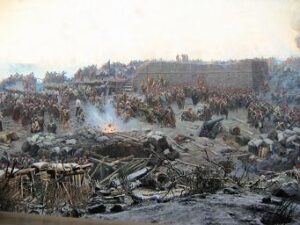Last month raised the matter of Battle. It took us to very personal matters of whether through our role playing we learn to view fighting as a preferred solution or a necessary evil. Yet it also introduced another question, the question of how to tell whether war is the right thing to do. That question is difficult to answer in reality; it is far more difficult to answer in fiction.

Siege of Sevastopol, panoramic painting by Franz Roubaud, depicting a battle in the Crimean War.
When I was in college, one of my fellow Bible students did some research for a paper about war, and came upon Neo-orthodox theologian Karl Barth’s treatise on the subject. Barth had undertaken a systematic theology of war and reviewed the biblical texts. According to my friend, in the end Barth suggested that the only way to know whether a particular war was a just war was to know whether God had ordained it; and, much more telling, he declared that a systematic theology cannot tell you how to know that.
A cursory glance at the wars reported in the Bible, and the position God expressed in relation to them, shows blindingly how inadequate our principles about what makes a just or holy war truly are. We believe that a war is bad if it destroys civilians, yet Israel was punished by God precisely for allowing civilians to live. (Arguing that we now can see health and safety reasons for this command is to some degree begging the question: certainly the Israelites knew nothing of such reasons, nor did those they were to destroy. Further, the fact that we can see possible reasons doesn’t mean we’ve necessarily identified why God commanded something.) We oppose wars of conquest and suggest that countries are always justified in defending themselves, but we see time and again in Jeremiah that God wanted Israel to surrender to Nebuchadnezzar, and kept promising that things would be far worse if they fought against this heathen conqueror He designated as His servant. We even think that God favors Christian countries over non-Christian countries (forgetting that there are no Christian countries, and never have been); but there was nothing remotely Christian about the Assyrian or Babylonian nations God sent against His people. These polytheistic idolaters had no understanding of the concept of one Creator God or His moral demands. Ultimately the only question that ever mattered in the wars reported in the Bible is whether God wanted His people to fight or not. With Barth, we are forced to admit that there is no principle that can answer that for you. In the final analysis, all you can do is ask God, and hope you understand the answer.
All of this is enormously complicating for our game worlds. It may be incredibly difficult to determine whether a real war is or is not God’s will. To determine whether or not a fictional war is His will invokes exactly the sort of problems we long ago addressed in In Vain: how do you pretend to know the mind of God about something fictional? We said there that it was not merely that we might make a mistake; it was that we could not possibly be right consistently. Asking whether an imaginary war is God’s will is like asking whether a fictional character can be saved. There is an essential disconnect that makes the question meaningless, and a serious possibility that attempting to force that kind of meaning into it is demeaning to God.
Yet we do create fiction in which characters are redeemed, knowing full well that this imaginary character cannot be in any real sense saved by God’s grace. Usually in creating such stories, we believe we are illustrating truths about God and man and salvation. If this is so, we can also tell truths about God and man through war stories. Within those stories, we can present war as being ordained by God, battles which He has directed should be fought, and of which He has determined the outcome.
How do we decide what outcome God has ordained for such imaginary wars? The truth is, we can do so any way we like. The war can be God’s punishment on a disobedient or evil people, even if the tool of that punishment is a more evil or more disobedient people. It can be a test of faith, in which God wants believers to trust Him for deliverance. We can make this decision before the battle begins, or allow it to play out and have the dice decide. Systematic theology cannot tell us whether a war is just or unjust because there are no clear cut rules about such things. God is not capricious in these matters; but He is inscrutable. We cannot easily know His position on the wars we face in this world, and our characters cannot always understand why He would want them to face the battles He ordains for them. In the end, we can learn much about God, ourselves, and good and evil, by allowing our imaginary worlds to fall into war.
Those who object to violence in games and fiction seek something unreal, imaginary worlds that do not reflect reality. There is nothing wrong with creating worlds that do not reflect reality; we discussed this long ago in Settings. There is also nothing wrong with creating worlds that reflect the evils and problems and challenges of the world God made, and that includes addressing within those the realities of war.
This article was originally published in June 2003 on the Christian Gamers Guild’s website. The entire series remains available at its original URL.
